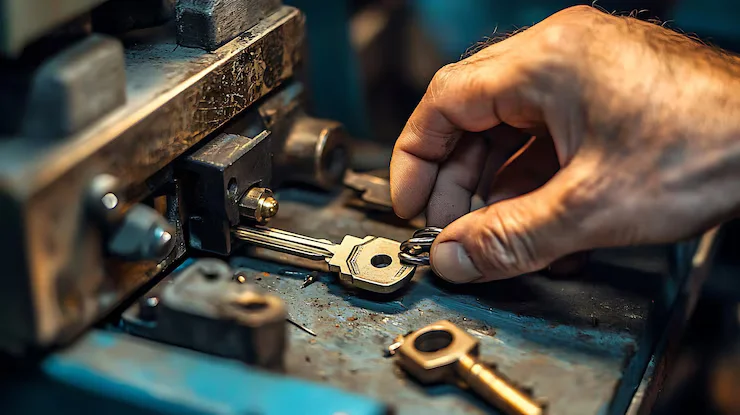In the world of locksmithing, key cutting is probably the most commonly provided service, alongside lockouts. From one of your kids reaching the age where they need their own set of keys to landlords who want a spare set made up for service professionals managing your affairs, there are so many reasons why we might decide we need a key cutting service. Now, you might have already looked around online and came across stuff like ‘DIY key cutting is easy!’ – it is NOT the case.
To help you get a better idea of what to expect when it comes to key cutting, take a look at our quick guide which has been prepared by an expert Doncaster locksmith. This will help you to understand the mystery behind key cutting, the main motivations for doing so and also some crucial insights so you get high-quality keys cut instead of cheap replacements that look like something you get out of a Christmas cracker!
Key Cutting: What Does It Involve?
Taken literally, key cutting sounds like you are trimming your bushes with a set of keys. As you probably know, that is not the case!
Key cutting is the catch-all term used for recreating (or duplicating) a set of keys. A direct replica of the keys you have is made. Naturally, this means that you still need to have the ‘source’ set of keys so that a copy can be faithfully recreated. While this is the basics of key cutting, there is far more to this industry, which might explain why you have such a wide choice of locksmiths to pick from.
Key Cutting: What Does The Process Involve?
Look around online, and you can find all manner of key-cutting tools that seem to cost pennies. However, given the cost of having keys cut by a professional locksmith (more on that in a minute), these tools are often overpriced. Not to mention the fact that most DIY key cutting tools aren’t worth the price you pay – the results they generate are, well, not very good – and that is being charitable.
Initial Cutting
Most locksmiths will use a key-cutting machine to do the job, then use their skill and hand-to-eye coordination to get the perfect finish on the key. To get started, a locksmith will place a ‘blank’ key into their key cutting machine, as well as the source key – the original key that is about to be copied. The original key is often fitted into a device that is right next to the key cutter itself.
Matching The Original
Then, the locksmith will carefully and precisely move the original key along a guide, with the blank key moving at the same time along a wheel-like device. This cuts the same key shape into the blank so that they are a 1-for-1 match with one another. Yet, even with the blank and the source key now very similar, the job is not done.
Final Additions
Now, a locksmith will need to go through the deburring process. This is where the skill really comes in. a locksmith will use a metal brush to get rid of any rough edges and ‘burrs’ left behind during the key cutting process. This is arguably the most important step, as without deburring, the new key could have rough edges that could injure someone, fray materials and even damage the lock it is used for. Who wants that!?
All it takes is a minor loss in concentration and attention to detail, and a duplicate key can become a genuine danger. Poorly cut keys are unlikely to work within the locks they are designed for; worse, they could even damage the lock. If you are looking to have a key cut, avoid using a DIY service you find on classified ads pages and seek to hire a professional.
Key Cutting: How Much Will I Pay?
Good question, and the answer depends on the kind of key you are going to have cut. The good news is that even highly specific key types are cost-effective in the extreme. At least, compared to having to get new locks fitted because you lost your old keys!
Generally, your standard house keys – Yale keys, as they are known – will cost you around £4-5 to have cut. More specific key types, such as Mortice keys, will still cost around £5-6 to get cut. There is not a huge price jump here. For high-end security keys, like a safe key, you could be in the region of £8 to 10 to have them cut.
How can you be certain that you are getting a good deal? Our general rule of thumb is that anyone charging you above the higher end of these price charts is at it, and anyone charging you significantly below is probably providing you with a key that isn’t even worth a few copper coins.
How Do I Order The Right Key Type?
If you go to see a locksmith in [LOCATION] in person, they should be able to tell you what key type you need just by looking at the source. If you prefer to use an online service, then you might need to do some more digging. First off, check your current key for any signs of numbers; most keys have a number etched on the front or back, and you can then use that number to get the same key type cut.
Sometimes, though, these numbers are template figures that do not really give you more information. If that is the case, we recommend speaking to a locksmith in person so they can give you the right information.
How Many Keys Should I Get Cut At Once?
There is no right or wrong answer here, really; it just comes down to how many keys you need. For example, if you have two kids who are reaching the age where they need their own keys, then it stands to reason that you need two keys to be cut. Our general rule of thumb is that every ‘adult’ in the house should have at least one set of keys each.
You might also wish to get a tertiary set of spare keys made up that can be used in emergencies and/or given to people you trust, like your next-door neighbour or a family member who lives within the vicinity of your home.
If you are getting commercial keys cut, though, then you probably only need a master key set that is used by the owner and then a key set given to your most trusted, senior members of staff. For example, if someone else has the responsibility of opening up the shopfront, they will need their own keys. For the most part, having the ‘master’ set of keys, the set of keys that you actually use, and a third spare set of keys is par for the course.
Conclusion: Always Use A Professional Key Cutting Service
Now, you hopefully have a better idea about the numbers involved when it comes to getting keys cut. There is no one-size-fits-all solution, really; you just need to judge how many keys you need based on your personal circumstances. No matter how many keys you need, though, always go to a professional] locksmith to get the job done.
DIY jobs and cheap trick alternatives never provide you with better value for money. The few pounds you ‘save’ will usually cost you down the line through faulty keys that break your locks or keys that do not work from the get-go.







